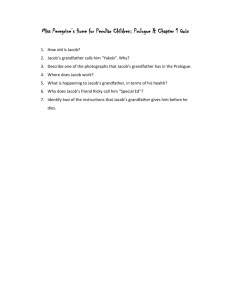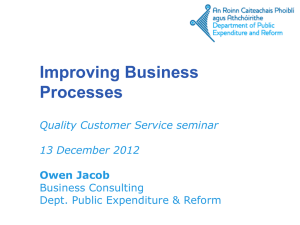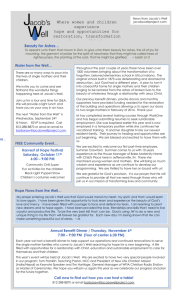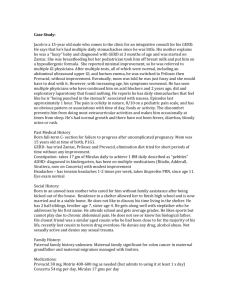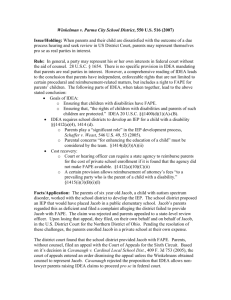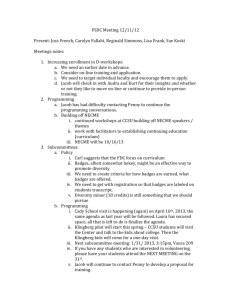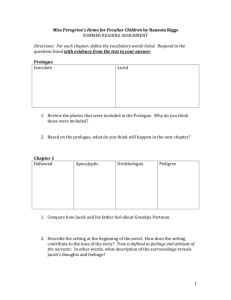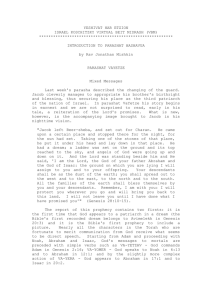sermon_10-12-2008_Neumann
advertisement
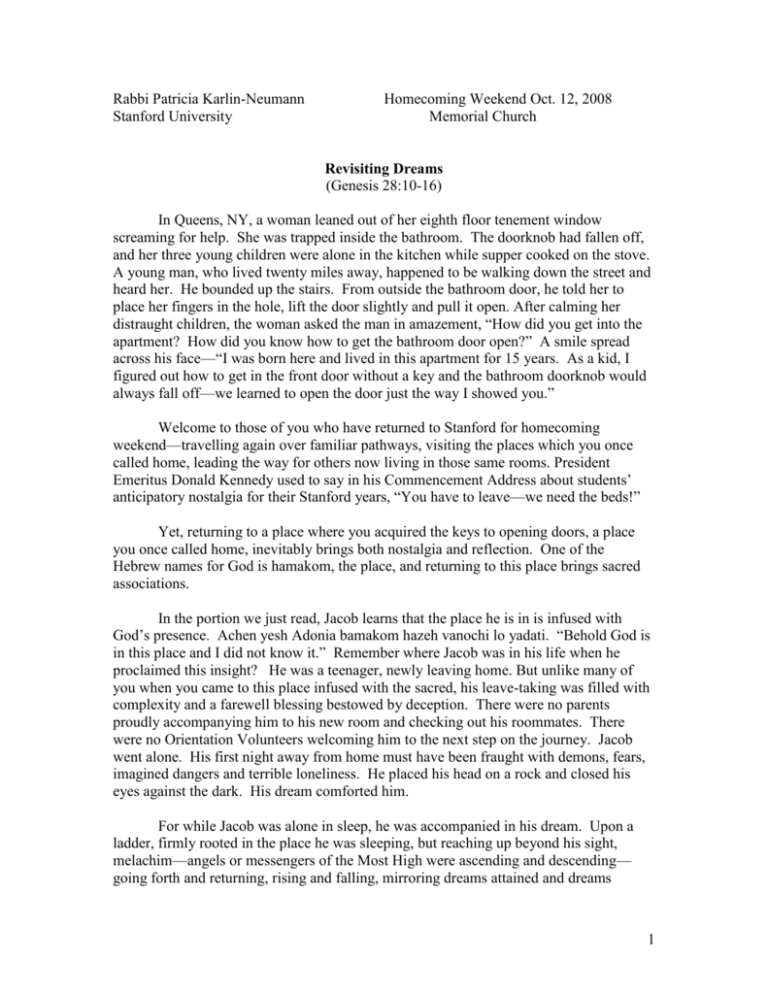
Rabbi Patricia Karlin-Neumann Stanford University Homecoming Weekend Oct. 12, 2008 Memorial Church Revisiting Dreams (Genesis 28:10-16) In Queens, NY, a woman leaned out of her eighth floor tenement window screaming for help. She was trapped inside the bathroom. The doorknob had fallen off, and her three young children were alone in the kitchen while supper cooked on the stove. A young man, who lived twenty miles away, happened to be walking down the street and heard her. He bounded up the stairs. From outside the bathroom door, he told her to place her fingers in the hole, lift the door slightly and pull it open. After calming her distraught children, the woman asked the man in amazement, “How did you get into the apartment? How did you know how to get the bathroom door open?” A smile spread across his face—“I was born here and lived in this apartment for 15 years. As a kid, I figured out how to get in the front door without a key and the bathroom doorknob would always fall off—we learned to open the door just the way I showed you.” Welcome to those of you who have returned to Stanford for homecoming weekend—travelling again over familiar pathways, visiting the places which you once called home, leading the way for others now living in those same rooms. President Emeritus Donald Kennedy used to say in his Commencement Address about students’ anticipatory nostalgia for their Stanford years, “You have to leave—we need the beds!” Yet, returning to a place where you acquired the keys to opening doors, a place you once called home, inevitably brings both nostalgia and reflection. One of the Hebrew names for God is hamakom, the place, and returning to this place brings sacred associations. In the portion we just read, Jacob learns that the place he is in is infused with God’s presence. Achen yesh Adonia bamakom hazeh vanochi lo yadati. “Behold God is in this place and I did not know it.” Remember where Jacob was in his life when he proclaimed this insight? He was a teenager, newly leaving home. But unlike many of you when you came to this place infused with the sacred, his leave-taking was filled with complexity and a farewell blessing bestowed by deception. There were no parents proudly accompanying him to his new room and checking out his roommates. There were no Orientation Volunteers welcoming him to the next step on the journey. Jacob went alone. His first night away from home must have been fraught with demons, fears, imagined dangers and terrible loneliness. He placed his head on a rock and closed his eyes against the dark. His dream comforted him. For while Jacob was alone in sleep, he was accompanied in his dream. Upon a ladder, firmly rooted in the place he was sleeping, but reaching up beyond his sight, melachim—angels or messengers of the Most High were ascending and descending— going forth and returning, rising and falling, mirroring dreams attained and dreams 1 denied. In the transition from youth to adult, Jacob was accompanied by others, by messengers, by those who helped him to know what to strive for and how to cushion a fall. In the text of this story, we read, “Vehinei sulam…v’hinei adonai nitzav alav,” “And behold a ladder and…God is standing alav, upon it.” (Genesis 28:12). Alav is often translated, upon it, but it can also mean, “with him”. God is standing with Jacob. God is standing with Jacob through those Divine Messengers who assist him in moving from youth to adult, those divine messengers who accompany him on the way, those divine messengers who help him to become the best he can be. All of you, all who have returned to Stanford this weekend to remember and to reflect, along with all of you who are presently studying, making the transition from youth to adult, are part of a congregation of divine messengers. Together, you form a community across time and space, witnessing for one another the aspirations and the disappointments, the preparation and the achievement of one another’s dreams. In the Biblical story, Jacob exclaims, “Ma norah hamakom hazeh. Ain ze ki im beit elohim.” “How awesome is this place! This is none other than God’s house.” (Genesis 28:17) And how awesome, too, is this place-- filled with friends, memories, rituals, community. How awesome! A place filled with divine messengers of vision, with those who imagined the heights to which we might climb, cheered us along the way and talked us out of locked buildings when we lost our keys or the knobs fell off the doors. In Jacob’s story, God promises, “And here I am with you, and I’ll watch over you everywhere that you’ll go, and I’ll bring you back to this place.” (Genesis 28:15) And so it is with you, brought back for dreaming, brought back for reflection, and brought back for friendship. In returning to a sacred place, the place where youth meets adulthood, we let our deepest hopes speak, we listen for our lives. As William Stafford writes in his poem, Ask Me, Some time when the river is ice ask me mistakes I have made. Ask me whether what I have done is my life. Others have come in their slow way into my thought, and some have tried to help or to hurt: ask me what difference their strongest love or hate has made. I will listen to what you say. You and I can turn and look at the silent river and wait. We know the current is there, hidden: and there are comings and goings from miles away that hold the stillness exactly before us. 2 What the river says, that is what I say. May we, together on this homecoming weekend, listen and dream as we have been brought to this awesome place. May the messengers of the Most High accompany us as we ascend and descend and may we know, with Jacob, that God is in this place. Story is found in Small Miracles: Extraordinary Coincidences from Everyday Life Yitta Halberstam (p. 122-123) “Ask Me” is found in Let Your Life Speak Parker Palmer Thanks to the Reverend Nurya Love Lindberg for calling my attention to Let Your Life Speak 3
